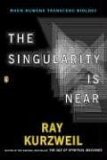Summary | Excerpt | Reviews | Beyond the Book | Readalikes | Genres & Themes | Author Bio

Critics' Opinion:
Readers' Opinion:
First Published:
Sep 2005, 672 pages
Paperback:
Sep 2006, 672 pages
Muriel Rukeyser says that 'the universe is made of stories,
not of atoms.' In chapter 7, I describe myself as a 'patternist,' someone who
views patterns of information as the fundamental reality. For example, the
particles composing my brain and body change within weeks, but there is a
continuity to the patterns that these particles make. A story can be regarded as
a meaningful pattern of information, so we can interpret Muriel Rukeyser's
aphorism from this perspective. This book, then, is the story of the destiny of
the human-machine civilization, a destiny we have come to refer to as the
Singularity.
Chapter One
The Six Epochs
Everyone takes the limits of his own vision for the limits of
the world.
—Arthur Schopenhauer
I am
not sure when I first became aware of the Singularity. I'd have to say it was a
progressive awakening. In the almost half century that I've immersed myself in
computer and related technologies, I've sought to understand the meaning and
purpose of the continual upheaval that I have witnessed at many levels.
Gradually, I've become aware of a transforming event looming in the first half
of the twenty-first century. Just as a black hole in space dramatically alters
the patterns of matter and energy accelerating toward its event horizon, this
impending Singularity in our future is increasingly transforming every
institution and aspect of human life, from sexuality to spirituality.
What, then, is the Singularity? It's a future period during
which the pace of technological change will be so rapid, its impact so deep,
that human life will be irreversibly transformed. Although neither utopian nor
dystopian, this epoch will transform the concepts that we rely on to give
meaning to our lives, from our business models to the cycle of human life,
including death itself. Understanding the Singularity will alter our perspective
on the significance of our past and the ramifications for our future. To truly
understand it inherently changes one's view of life in general and one's own
particular life. I regard someone who understands the Singularity and who has
reflected on its implications for his or her own life as a ñsingularitarian.î1
I can understand why many observers do not readily embrace
the obvious implications of what I have called the law of accelerating returns
(the inherent acceleration of the rate of evolution, with technological
evolution as a continuation of biological evolution). After all, it took me
forty years to be able to see what was right in front of me, and I still cannot
say that I am entirely comfortable with all of its consequences.
The key idea underlying the impending Singularity is that the
pace of change of our human-created technology is accelerating and its powers
are expanding at an exponential pace. Exponential growth is deceptive. It starts
out almost imperceptibly and then explodes with unexpected fury—unexpected, that
is, if one does not take care to follow its trajectory. (See the ñLinear vs.
Exponential Growthî graph on p. 10.)
Consider this parable: a lake owner wants to stay at home to
tend to the lake's fish and make certain that the lake itself will not become
covered with lily pads, which are said to double their number every few days.
Month after month, he patiently waits, yet only tiny patches of lily pads can be
discerned, and they don't seem to be expanding in any noticeable way. With the
lily pads covering less than 1 percent of the lake, the owner figures that it's
safe to take a vacation and leaves with his family. When he returns a few weeks
later, he's shocked to discover that the entire lake has become covered with the
pads, and his fish have perished. By doubling their number every few days, the
last seven doublings were sufficient to extend the pads' coverage to the entire
lake. (Seven doublings extended their reach 128-fold.) This is the nature of
exponential growth.
From The Singularity is Near by Ray Kurzweil. Copyright Ray Kurzweil 2005. All rights reserved. Reproduced by permission of the publisher.





The House on Biscayne Bay
by Chanel Cleeton
As death stalks a gothic mansion in Miami, the lives of two women intertwine as the past and present collide.

The Flower Sisters
by Michelle Collins Anderson
From the new Fannie Flagg of the Ozarks, a richly-woven story of family, forgiveness, and reinvention.

The Funeral Cryer by Wenyan Lu
Debut novelist Wenyan Lu brings us this witty yet profound story about one woman's midlife reawakening in contemporary rural China.
Your guide toexceptional books
BookBrowse seeks out and recommends the best in contemporary fiction and nonfiction—books that not only engage and entertain but also deepen our understanding of ourselves and the world around us.